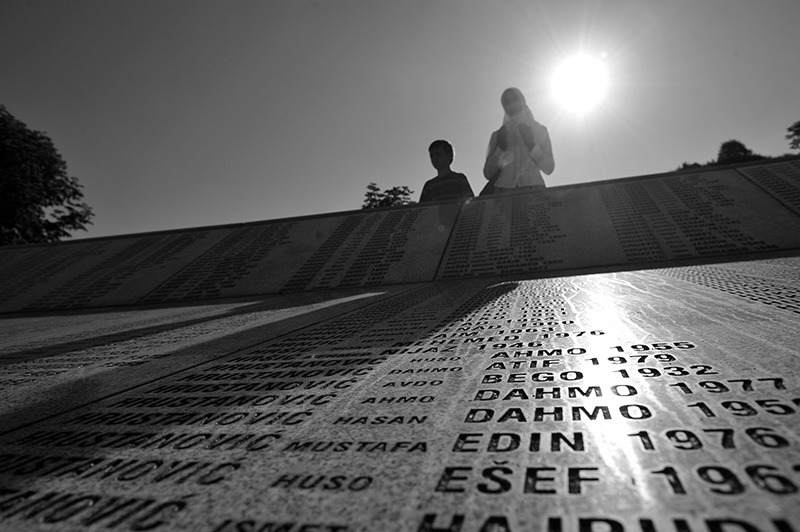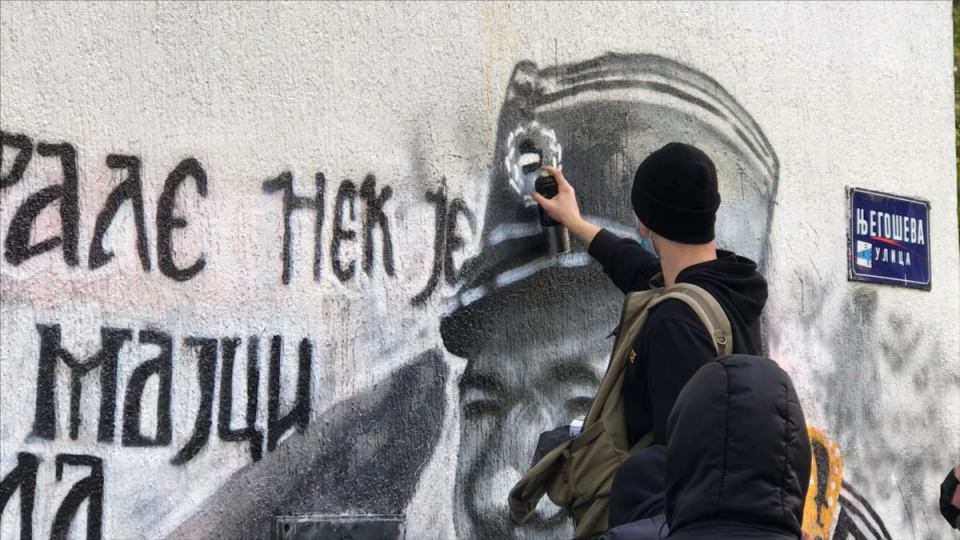
On July 23rd, 2021, Valentin Inzko, the High Representative for Bosnia and Herzegovina (BiH), introduced a Law on the Amendment to the Criminal Code of Bosnia and Herzegovina punishing the denial of international crimes and glorification of war criminals. Coming shortly before the end of his mandate, this decision, in Inzko’s words, was taken after “all chances offered to the domestic authorities to distance themselves from war criminals were ultimately rejected.”
Previous attempts to introduce such a law have been made by the Parliament of Bosnia-Herzegovina. However, since 2007 the enaction of a ban has been continuously vetoed by both Bosnian Serb MPs and the Bosnian-Croat nationalist party, the Croatian Democratic Union (Hrvatska demokratska zajednica; HDZ). For this reason, the new law was imposed by the High Representative through the so-called Bonn Powers.
As soon as the law was introduced, it stirred tensions within the country. Milorad Dodik, the Serb representative of the tripartite Presidency of BiH, threatened the secession of the Republika Srpska (RS), the country’s majority Serb entity. RS President Zeljka Cvijanovic also moved quickly to make the new measure inapplicable in that entity. If the rationale behind the law is generalizable, this article aims to investigate the possibility of criminalizing denial not only in BiH, but also more widely in Europe.
Debated Laws
In recent years, punitive memory laws have increasingly been gaining attention, especially after the Council Framework Decision 2008/913/JHA which invites the EU Member States to adopt legislation punishing the negation of international crimes.
First of all, it is necessary to distinguish between revisionism and negationism. While the former constitutes part of historians’ work and is usually based on new evidence, the latter is aimed to distort historically proven facts or deny that they have ever occurred. Thus, when negationism is targeted at historical events such as the Holocaust, whose condemnation is part of the core values of a society, the state intervenes to say: “we need to remember this historical fact in a certain way” (Fronza, 2006).
Most importantly, negationism can be a form of hate speech, which is the case in BiH. Recalling the work of Robert Kahn on the Holocaust, it is possible to draw parallels. Focusing on the context, if brazen denial of the Holocaust in Germany and Austria constitutes hate speech, then denying the Srebrenica genocide in BiH has the same implication. This is for two reasons. Firstly, denial offends survivors and makes them feel unsafe. Secondly, it attempts to discredit the victims of genocide, and as such “isolates those connected to the victims from the rest of the human race” (Kahn, 2011). Thus, negationism alone can inflict serious harm, to both groups and individuals.

A third dimension which needs to be considered is the glorification of war criminals and their crimes. According to Hariz Halilovich, a professor at the RMIT University of Melbourne, this “goes beyond genocide denial. It is not ignorance, neither denial itself. It is something different: triumphalism.” Today, triumphalism and denial have entered popular culture. “You see people singing that Srebrenica should be repeated three times and calling for new massacres,” continues Professor Halilovich, “No other post-conflict societies had to deal with that, neither Germany nor Rwanda. This is something very unique to the Bosnian context, where genocide denial is also embedded in the political discourse”. This dimension is obviously unbearable and deeply offending for both the survivors and the victims.
Punitive memory laws aim to fulfill multiple functions: to defend a “state-established truth” and memory, to protect the dignity of survivors, to prevent hate speech, and to punish the glorification of violence. Whether or not these expectations are met by such laws is theoretically debated, with three weaknesses commonly pointed out.
Firstly, a punitive solution clashes with freedom of expression. For some, “the denial of rights in the defense of officially sanctified ‘truth’” (Hayden, 2008) pose a concrete risk to personal liberty. Nevertheless, the recent amendment to the Bosnian Criminal Code seems to be balanced with the right to express different opinions, as it punishes only conduct which publicly denies judicial findings or is likely to encourage hatred and violence. Thus, the law would only be applied in cases of strict necessity.
Secondly, the law might polarize the consent around the deniers (Fronza, 2012). Punishing them can activate a sort of victimization mechanism and consolidate their ranks while contributing to propagating their distortions. As of today, no one has been tried in BiH for violating the new law and it is therefore too soon to draw conclusions. However, the use of memory laws in some European countries has shown that this is a potential risk. As the Italian historian Carlo Ginzburg puts it, where laws on negationism have been adopted, the courts have become a formidable sounding board for deniers’ arguments. On the other hand, this is not always the case. As Sarajevo-based genocide scholar Hikmet Karčić underlines, the case of Holocaust denier David Irving against the historian Deborah Lipstadt proves the exact opposite. “What happened is that she became more famous than he did,” he says, “and then she was made a hero.”
Thirdly, there is uncertainty surrounding the law’s actual implementation. As Karčić points out, “To enact such a law does not mean that this is going to be implemented,” which he says is his main issue, adding that he does not “believe that local prosecutors are brave enough to file an indictment against somebody for denying genocide.”
Memory, Law, and Constitution in BiH
After having briefly discussed the aims and weaknesses of punitive memory laws, it is necessary to clarify the purpose of the Bosnian regulation. This law differs from the memory laws adopted in other European countries which also protect a shared memory of the past and the core values of the society.
For example, the German Constitution was born on the rejection of Nazi fascism and the Holocaust. Thus, while the punitive memory law adopted in Germany protects the “constituent pact” (Fronza, 2012) and is rooted in its national identity, it is hard to say the same for BiH, where the same pact, namely the Constitution, crystallized the country’s ethnic partition and thus opposing narratives of the past. The history of the Bosnian conflict is not yet agreed upon and ‘different truths’ collide regarding these events. Therefore, for some, adopting a punitive response in a transitional context is seen as a potential trigger for an internal “memory war”.
In order to better understand the purpose of the recent law, we can draw a parallel with the constitutional structure of Germany. Carna Pistan, a scholar and researcher at the Harriman Institute of Columbia University, compares the two constitutions. “On one hand, German and Bosnian constitutions are very similar,” she explains, “since both were imposed internationally. Nevertheless, there is a difference. On one hand, we have the German constitution, the one of ‘never again.’ Here we see an attachment to norms and values of the democratic constitution, called constitutional patriotism. In Bosnia-Herzegovina, it is the opposite. The constitution entailed in the Dayton Agreement has incorporated the ethnic partition, defining the three constituent peoples, in its preamble. Thus, the Constitution reproduces ethnic division, which reflects on the three different historical narratives present in the country.”
Hence, the purpose of this law is not to protect the Bosnian “constituent pact” as the expression of a shared narrative over the past. For this to happen, the Constitution needs to be reformed in a more inclusive sense, since it is also a requirement to enter the EU. Secondly, the aim of this law has little to do with promoting reconciliation. It has been imposed by an international body and the literature converges on the conviction that reconciliation cannot be imposed by external actors (Bloomfied et al., 2003). Nevertheless, according to Pistan, punishing negationism might help with reconciliation, “but only in the sense that it can prevent denial, glorification, and preserve the judicially established truth, being that this is the precondition to construct reconciliation and trigger democratic memory building.”
Punishing Strategic Denial
The purpose of the Bosnian punitive memory law needs to be circumscribed. It has little to do with common memory protection, reconciliation, and lack of acknowledgement. “Facts have been acknowledged,” explains Karčić, “the only issue we have now is the intentional distortion of proven facts.” This law serves to respond to the new wave of “strategic denial” brought forward by the Serb Bosnian establishment. Indeed, there has been a clear change in policy and denial is being used for political purposes. For instance, in 2004, Dragan Čavić, then the President of the RS, and his government acknowledged the crimes that were committed in Srebrenica. Conversely, Dodik recently asserted that empty coffins were buried in Srebrenica.
Nowadays, as Karčić underlines, “The law was much needed because the denial level is high and brutal, not among ordinary people, but among politicians.” Thus, the irresponsibility of politicians had an impact on the people’s perception. According to Professor Halilovich, one of the reasons for genocide denial is the narrative that nationalists have been fomenting. “Serb nationalists invented that if Serbs admit genocide, they will be considered a ‘genocidal people.’ But there is no such a thing. What is important to discuss and acknowledge is individual accountability.” Luka Šterić, a researcher at the Belgrade Centre for Security Policy, points out that “in Republika Srpska very few people accept the decision by the Hague tribunal (…) that there has been genocide in Srebrenica, because in their heads that would delegitimize the whole notion of existence for Republika Srpska.”

Finally, the rhetoric of denial and triumphalism certainly finds fertile ground as a result of the fact that the education system has been hijacked. “History that children normally learn in Bosnia-Herzegovina ends in 1992,” explains Professor Halilovich, “however, nationalist narratives are pushed into other subjects like literature and geography.”
The ban was much needed, and there is general agreement that it should have been introduced earlier. Perhaps if it had been implemented immediately after the war, it could have played a positive role in the process of dealing with the past. In this sense, an opportunity may have been missed.
However, today it is necessary to punish hate speech and distortions of historical reality regarding the Srebrenica genocide, which deeply wound the survivors. Choosing to pursue policies of denial and minimization is irresponsible and perpetuates the constant indignation and insecurity experienced by survivors who fell under constant threat.
This law is unique. As Pistan points out, it is part of a new category of internationally enforced punitive memory laws. This is why it was appropriate to try to understand its purposes. As discussed, the focus is not so much on the protection of the Bosnian “constituent pact” or on promoting reconciliation as it is on the need to protect the dignity of the survivors and the memory of the victims. In this way, it seeks to stem the current of denial which pervades the political discourse and remove a formidable obstacle to mutual understanding.
The law, as of today, has had some impact. “What is interesting is that the number of denialist rhetorics lowered online,” notices Karčić, and adds “we will see how the situation will be now regarding the 11th of July” on which the 27th anniversary of the Srebrenica genocide will be commemorated.






